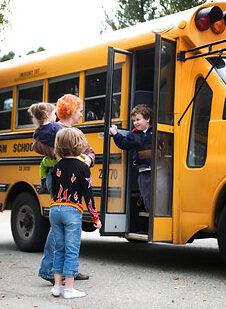Shannon Des Roches Rosa
What I want people to know—and why I write—about parenting my
autistic son
 |
| Photo © Jonathan Mandel [image: A white mother with orange hair holds a toddler on her hip while standing with a young child, as a third child emerges, smiling, from a school bus.] |
When I realized my middle child was autistic and therefore disabled, I
had a visual epiphany similar to the wide-eyed new parent who suddenly
sees babies everywhere—except I saw short buses.
Short buses. The kind of yellow schoolbuses that take kids like my autistic son to and from
school every day. They’re everywhere, and if you don’t believe me,
take a tally the next time you drive around any reasonably-sized town.
Then think about all the kids who must be riding on those buses, and
those kids’ parents and families. Think about all the kids who used to
ride that bus and are now adults. That’ll give you some idea about the
size of the local community of people with significant disabilities. I’m guessing it’s larger
than you might have thought.
That’s the kind of thinking I’m hoping to jumpstart. I want you to see
all of those buses, and consider what they represent.
More than that, I want you to feel comfortable with my son. I want
you to feel so comfortable that you don’t give his disabilities any
more thought than you do the quirks of “typical” kids who never say
thank you, pee on the sidewalk when they think no one’s looking, or
live on nothing but chicken nuggets.
I want you to get to know my son and the people with disabilities in
your life, in your neighborhood, in your kids’ schools, to learn what
makes those people worth knowing because they are unique, not because
they’re disabled.
That knowledge and ease doesn’t always come naturally. During my own
elementary school years, children with “special needs” were rarely seen
or heard, and never included. They were kept apart from us other
students, which meant we were implicitly taught to consider them separate, and unapproachable.
I don’t want my son to be hidden away like that, to be an
unmentionable. I don’t want his siblings to feel like they can’t talk
about their autistic brother with their friends. I don’t want those friends or my kids’ cousins to pussyfoot around my middle child’s autism. I want all of
those kids to discuss disabilities as freely as they do eye, skin, and
hair color. I want them to try to include my son in the discussion, and
then laugh instead of squirm if his reaction is inappropriate.
I want you to feel the same way.
I also want you to understand that as positive as I try to be and as
much as I love my son and despite all the sweet times we have
together, I would be lying if I told you that this kind of parenting is a
cakewalk. (Parenting is never a cakewalk.) Instead, I’m going to
tell you what it’s really like to have a kid with significant disabilities. I
promise to be entertaining, or at the very least engaging. In return I
expect you to listen and learn, and hopefully, eventually, to take
action.
I don’t mind if you decide to sit on the sidelines for a while while you absorb what I have to say. I don’t even mind if you indulge in occasional voyeur’s comparisons with your own non-disabled children, or differently disabled children—or lack of children. But I do hope that, once you’ve listened for a while, you’ll understand why children with disabilities are not only worthy of your attention, but they’re your responsibility, too.
Childless or child-full, if you are of parenting age and live in the
United States, then you will be supported by and/or have to support my
son’s generation. Think about that. And then I hope you will realize how critical it is to challenge those who complain about the expense of educating students with disabilities, or try to spin them as burdens on the rest of society—because it makes financial sense to invest in my son and people like him. While some disabled people may never be “contributing members of society,” and that’s OK, it costs society a heck of a lot more to relegate all people with disabilities to life-long dependency.
Whether you choose to learn, participate, and help foster attitudes of
inclusivity that will eventually lead to better care, opportunities,
employment, and community for people with disabilities is up to you.
I’d love to help show you the way, if you’re willing.